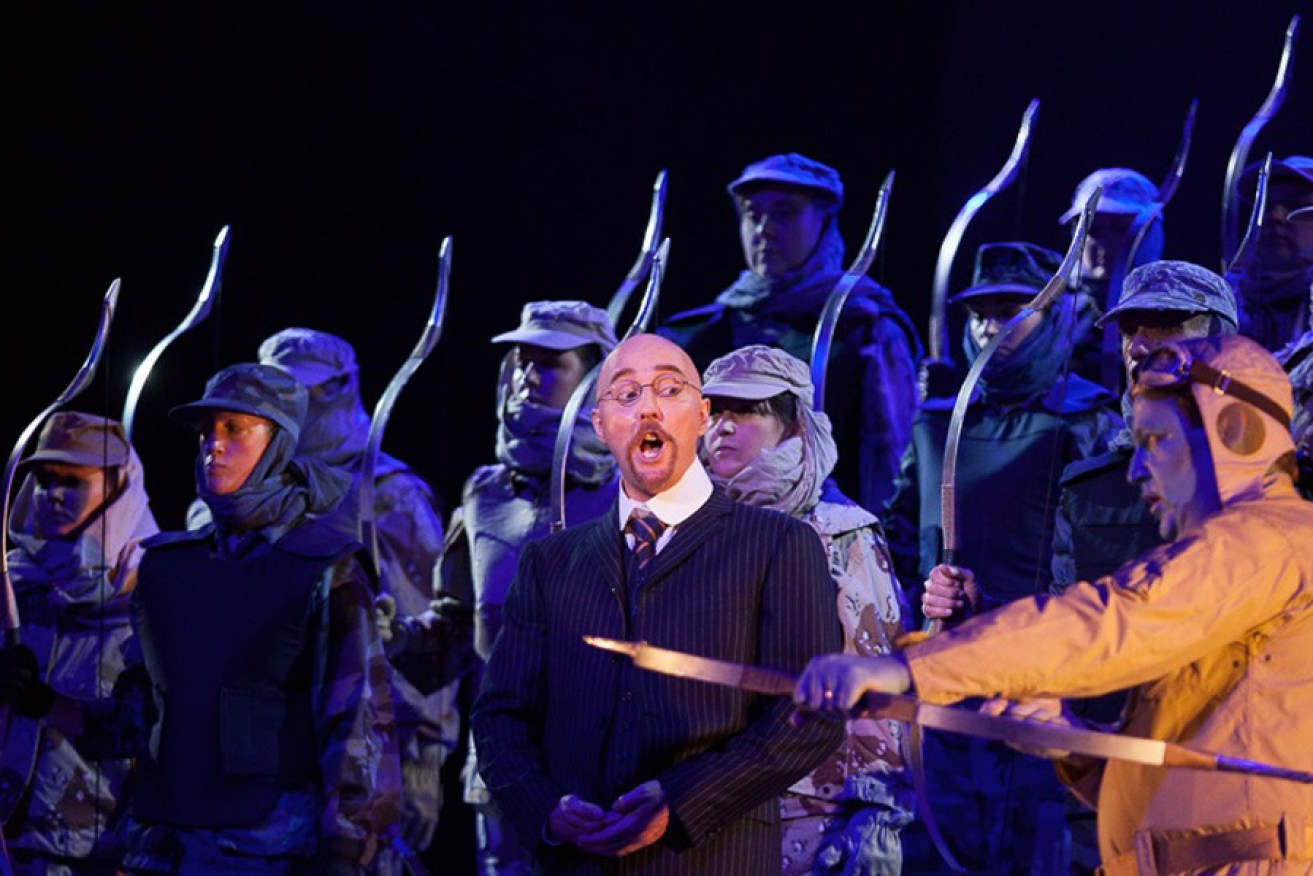The Philip Glass Trilogy: Satyagraha

Opera SA's Satyagraha. Photo: Darren Williams Photography
Satyagraha, which completes Opera SA’s Philip Glass Trilogy, explores both musically and visually the influence of men of vision (Akhnaten, Einstein and Gandhi) and how they shaped the people around them.
This is the work that most resembles an opera in its having a leading character, some story, soloists, a chorus, and recurring themes and motifs in the score.
The text is taken from the Bhagavad Gita and sung in Sanskrit; the language, melodies and harmonies create a sound that is breath-taking and provides a truly metaphysical experience for the audience. Gandhi was a great leader who led a nation of people to independence from a colonial master through peaceful resistance, and the audience experiences vicariously the charisma and influence of the man in Satyagraha in a profound and moving way.
Mary Moore’s set consists of steps that rise as a temple upstage and provides a functional setting for designer Geoff Cobham to employ his palette of lighting effects to illuminate the cast and dancers. The various changing hues and harmony between the lighting and set reflect the serenity created by the music and dancers.
A circle of soft light dominates upstage, providing a perfect background to highlight and present Adam Goodburn, who closely resembles Gandhi as a young lawyer in a suit in 1910. From the very beginning, Goodburn establishes Gandhi as humble, proud, conscious of injustice and a leader of his people. He sings magnificently throughout and his voice resonates in the theatre just as Gandhi’s did throughout India.
Goodburn is ably supported by Deborah Caddy, as Miss Schlessen, and Naomi Hede as Mrs Naidoo, dressed in traditional yellow and orange saris which look striking against the blues. Mark Oates, as Arjuna, and Joshua Rowe, as Krishna, in non-traditional costumes, sing powerfully as they establish their influence on Gandhi. Cherie Boogart brings a strength and presence to the role of Kasturbai.
The chorus appears in military uniforms when Gandhi is in South Africa as he gradually learns of injustice, racial prejudice and how to resist oppression. The defiant act of burning passbooks is slow and meditative, as is the nature of Satyagraha, which allows the audience to contemplate the power of collective action, the power of peaceful defiance and historical events of individuals overcoming injustice.
At the end of Act 2, Gandhi, now in the traditional, simple Hindu clothing we associate him with, is imprisoned with his followers; slowly, prison bars are lowered to enclose them all. Images of great beauty and political power that allow for personal introspection occur throughout this brilliantly conceived opera.
The marvelous Adelaide College of the Arts dancers, dressed in sheer body stockings tinged with blue, keep close to Gandhi and bring to life Leigh Warren’s impressive choreography as they became water, birds and animals and the spirit of the people. Cobham’s lighting often immerses the stage in soft blues, with bright yellows giving Gandhi and the dancers a celestial glow, successfully creating a possible spiritual experience for the audience.
The Adelaide Symphony Orchestra brilliantly performs the demanding orchestration and, in this opera, the demands on woodwinds and strings are great. The final image of Gandhi up high, attaining enlightenment as the dancers, in rows, smoothly shift from lotus positions to images influenced by traditional Indian movement, is a joy to behold.
The performance of Satyagraha completed the first week of the State Opera of SA’s performances of The Philip Glass Trilogy and special mention must be made of the 12 members of the chorus who performed in all three operas – an astonishing feat of concentration, skill, endurance and musicality.
Timothy Sexton, conductor and driving force behind staging the trilogy, must be exhausted and exhilarated. I hope that Her Majesty’s reverberates with the sound of enthusiastic ovations for the remainder of the season.
Satyagraha will be presented again at Her Majesty’s Theatre on August 16 and 23. Akhnaten, the first work in The Philip Glass Trilogy, will be presented again on August 12 and 19, with second work Einstein on the Beach on August 14 and 21.
Review: Philip Glass Trilogy – Akhnaten
Review: Philip Glass Trilogy – Einstein on the Beach




